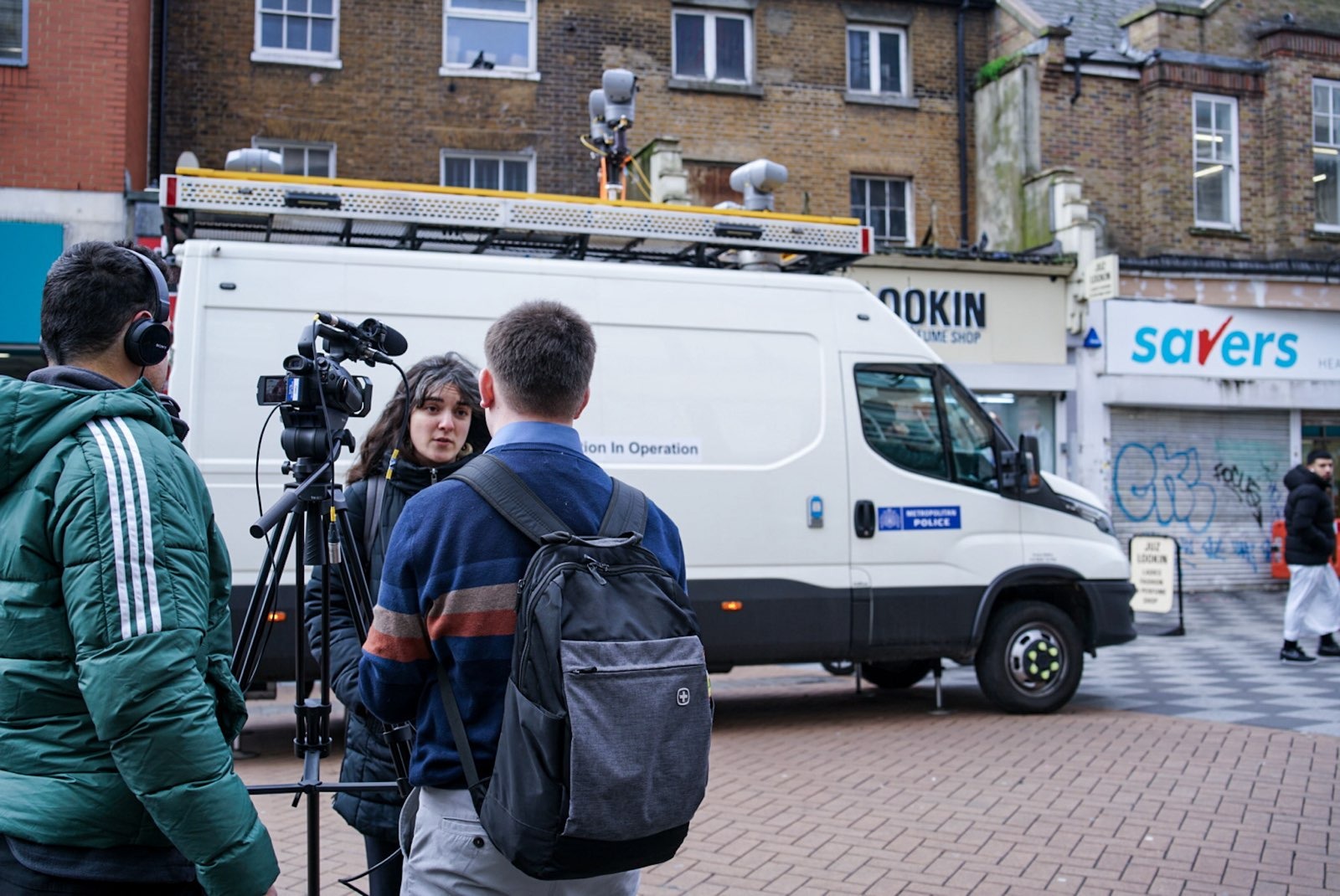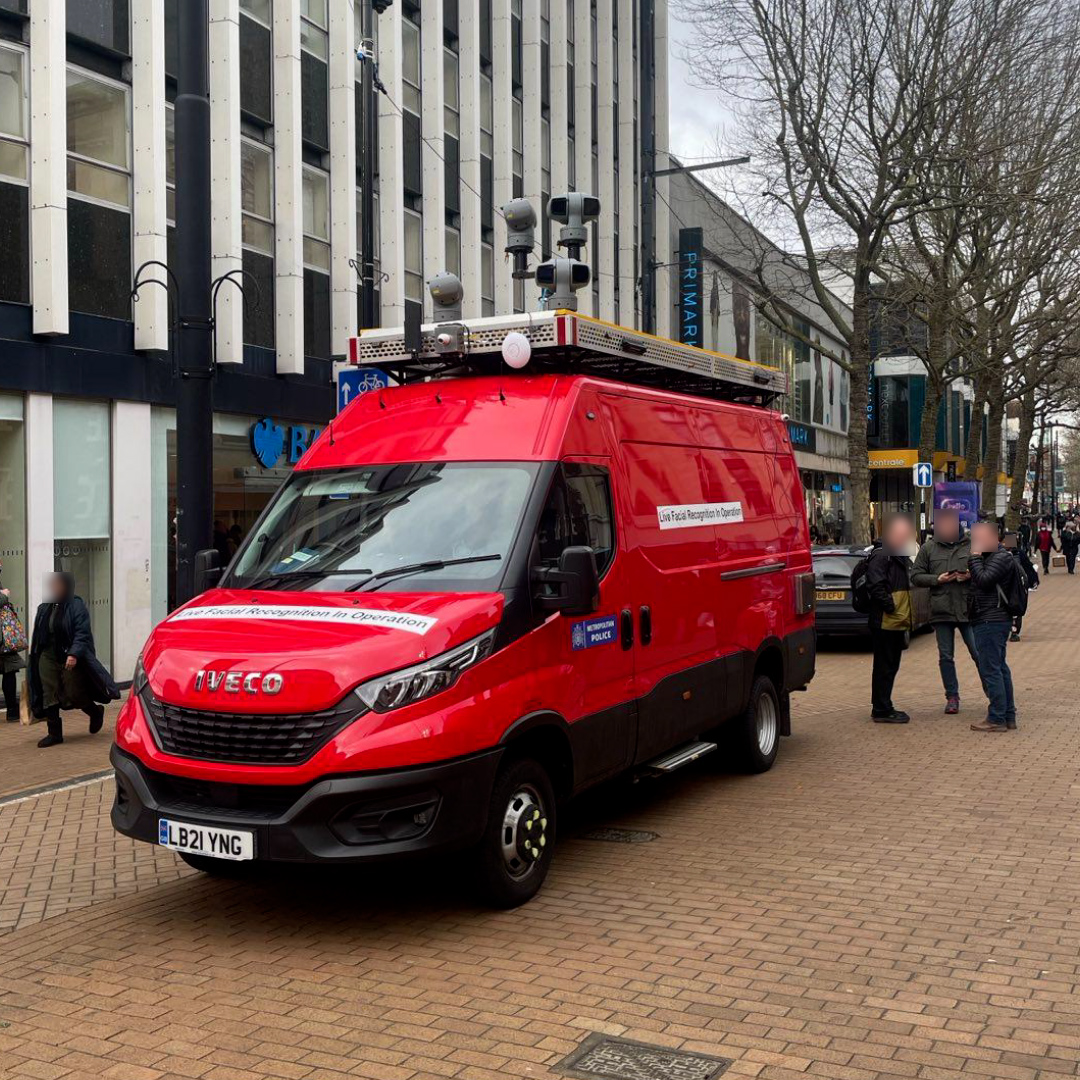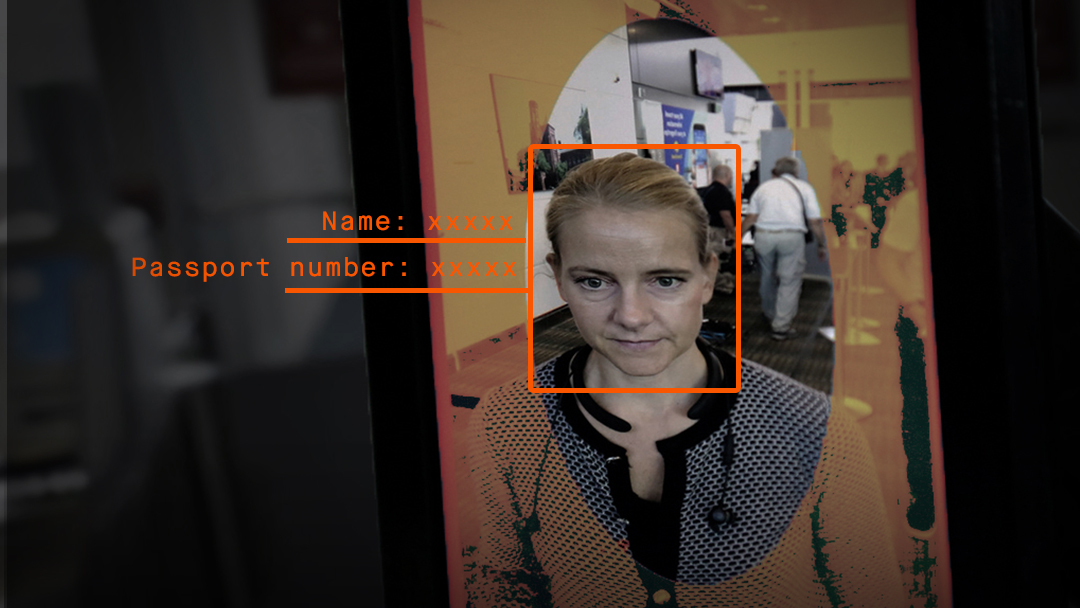PETITION
We’re sending a message to the Home Secretary and Met police chief Mark Rowley that facial recognition has no place in British policing.
We’re urging them to immediately stop using authoritarian live facial recognition, and if enough of us join the call, we can make them rethink. Sign (and share!) here:
SIGN HEREBiometric Britain
The boom in facial recognition technology in the UK, operating in a largely lawless space, is a mortal threat to privacy as we know it.
To power the fight back, we’ve compiled detailed research and analysis on the spread of this technology – and what needs to be done to combat it. Read more here:
The facts
Tens of millions of people in the UK
SCANNED
Police, shopping centres, concerts, museums, stadiums, bars found to have used the surveillance
There is no law for facial recognition in the UK
Met and South Wales Police facial recognition over 85% inaccurate 2016-2023
3,000+ people wrongly identified by police facial recognition
Facial recognition banned in San Francisco + 13 other cities
Research shows that facial recognition discriminates against women and people of colour.
TAKE ACTION
1
JOIN US
The strength of our campaigns to reclaim privacy and defend freedom relies on your support. Join the fight for the future — support us today.
2
SIGN THE PETITION
Tell the Met Commissioner and Minister for Policing to stop using facial recognition surveillance now. If enough of us sign, they’ll be under pressure to reconsider the decision. Please share the petition with as many people as you can.
3
SUBSCRIBE
Don't miss out on live facial recognition alerts! Subscribe to our newsletter to stay informed on campaign actions.
Got a tip? If you have any information about facial recognition surveillance in the UK that might help our investigation, please let us know. Email us at info@bigbrotherwatch.org.uk or text us on Signal at +44 7514913266
Our campaign
We’re leading a national campaign against facial recognition, bringing together 65 parliamentarians from across the political spectrum and 32 of the country’s leading rights and race equality groups to stand together against this surveillance expansion and call for an immediate stop to live facial recognition surveillance of public spaces by police and private companies in the UK.
This cross-party action is backed by former Brexit Secretary David Davis MP, Leader of the Liberal Democrats Sir Ed Davey, Green MP Caroline Lucas and former Shadow Attorney General Shami Chakrabarti among others.
| Name | Party |
|---|---|
| David Davis MP | Conservative |
| Christine Jardine MP | Liberal Democrat |
| Ed Davey MP | Liberal Democrat |
| Wera Hobhouse MP | Liberal Democrat |
| Layla Moran MP | Liberal Democrat |
| Tim Farron MP | Liberal Democrat |
| Mick Whitley MP | Liberal Democrat |
| Jamie Stone MP | Liberal Democrat |
| John McDonnell MP | Labour |
| Caroline Lucas MP | Green |
| Tommy Sheppard MP | Scottish National Party |
| Zarah Sultana MP | Labour |
| Valerie Vaz MP | Labour |
| Alistair Carmichael MP | Liberal Democrat |
| Chris Green MP | Conservative |
| Daisy Cooper MP | Liberal Democrat |
| Wendy Chamberlain MP | Liberal Democrat |
| Sarah Green MP | Liberal Democrat |
| Sarah Olney MP | Liberal Democrat |
| Munira Wilson MP | Liberal Democrat |
| Ian Byrne MP | Labour |
| Dawn Butler MP | Labour |
| Clive Lewis MP | Labour |
| Bell Ribeiro-Addy MP | Labour |
| Nadia Whittome MP | Labour |
| Rachael Maskell MP | Labour |
| Apsana Begum MP | Labour |
| Beth Winter MP | Labour |
| Ian Lavery MP | Labour |
| Richard Foord MP | Liberal Democrat |
| Richard Burgon MP | Labour |
| Rebecca Long Bailey MP | Labour |
| Andy McDonald MP | Labour |
| Joanna Cherry MP | Scottish National Party |
| Charles Walker MP | Conservative |
| Marcus Fysh MP | Conservative |
| Kim Johnson MP | Labour |
| Baroness Bennett | Green |
| Lord Strasburger | Liberal Democrats |
| Lord Clement-Jones | Liberal Democrats |
| Baroness Jenny Jones | Green |
| Baroness Shami Chakrabarti | Labour |
| Lord Strathcarron | Conservative |
| Lord Freyberg | Crossbench |
| Lord Vaux | Crossbench |
| Lord Hendy | Labour |
| Lord Sikka | Labour |
| Baroness Ludford | Liberal Democrats |
| Lord German | Liberal Democrats |
| Lord Beith | Liberal Democrats |
| Lord Marks KC | Liberal Democrats |
| Baroness Hussein-Ece | Liberal Democrats |
| Lord Dholakia | Liberal Democrats |
| Baroness Bakewell of Hardington Mandeville | Liberal Democrats |
| Baroness Hamwee | Liberal Democrats |
| Baroness Harris of Richmond | Liberal Democrats |
| Lord Oates | Liberal Democrats |
| Lord Storey | Liberal Democrats |
| Baroness Blower | Labour |
| Baron Davies of Brixton | Labour |
| Baron Woodley | Labour |
| Lord Skidelsky | Crossbench |
| Baroness Fox of Buckley | |
| Lord Alton of Liverpool | Crossbench |
OUR MISSION IS SIMPLE:
We’re fighting to urgently stop facial recognition surveillance from being used in our public spaces, whether by police or private companies. And we’re fighting to win.
HERE'S HOW WE'RE DOING IT:
INVESTIGATION
Our investigation into facial recognition in the UK is ongoing and we put information into the public domain as soon as we can. We work with media partners, including the BBC, to widely publish our findings. We have also passed on all of our findings to the data regulator, the ICO, and pressed them to investigate.
PROTESTS
When we are tipped off about future facial recognition deployments we attend to demonstrate, hand out leaflets, and observe any police/security action. It’s important we observe the police, so we can record and intervene in incidents like this. Want to join in? Sign up to our email updates
PARLIAMENT
We’re taking the campaign to the heart of power. We’ve launched two groundbreaking reports in Parliament, hosting high-profile MPs and Peers. We’ve since supported MPs tabling questions in parliament, we’ve circulated briefings for debates, and we’ve exposed the dangers of facial recognition in evidence for parliamentary committees and government working groups. (Find it all here.) We’ll continue pushing MPs and Peers to speak out against the use of facial recognition wherever we can.
BUILDING A MOVEMENT
We’re leading a national campaign against facial recognition, bringing together the country’s rights and race equality groups and politicians from across the political spectrum to stand together against this surveillance expansion. In September 2023, we issued a call for an urgent stop to facial recognition surveillance by police and private companies supported by over 180 tech experts and organisations.
LEGAL CHALLENGE
We initiated legal action in 2018 which forced the Met Police to slow down with facial recognition surveillance, be more transparent about its use — including giving us forewarning — and develop policies as to when they can and can’t use it.
But now, following Ed Bridges’ successful legal challenge to South Wales Police in 2020, we’re building the strongest fight we can against facial recognition in parliament and the press. Because as far as we've come, it's not enough - we need to BAN face surveillance.
REPORTS
We’re leading the fight back against the use of facial recognition surveillance in the UK – and our campaign is built on extensive expertise and analysis. We’ve published two groundbreaking reports, in 2018 and 2023, that lay out where, when and how facial recognition is being used and what needs to change.
IN THE MEDIA
What is facial recognition surveillance?
FACEPRINTS
This works by rapidly creating a biometric “faceprint” of your face – sensitive data that uniquely identifies you – much like a fingerprint, and comparing this for similar matches on a database.
Reference databases have been built from various sources including:
- CCTV images of “suspects” or “problem” individuals
- Subsets of the police’s enormous database of 19 million custody images, which includes vast numbers of photos of innocent people
- police intelligence databases, including innocent people with suspected mental health problems and political campaigners
But the possibilities are endless...
YOUR ONLINE LIFE UNLOCKED
Some facial recognition companies even check faces against internet data in real-time, trawling the entire internet to identify any photos of you, posted anywhere.
UK Facial recognition in detail
London
We have investigated the Metropolitan Police’s use of live facial recognition since ‘trials’ began in 2016. The force announced plans to roll out facial recognition across the capital in January 2020, vowing to begin using it operationally within weeks. These plans were delayed by the Covid pandemic, but in early 2022, the force started to deploy the technology again. The Big Brother Watch team attends London deployments wherever possible and has witnessed multiple misidentifications and concerning uses of the technology, including the targeting of Notting Hill Carnival two years in a row, and preventing people with suspected mental health issues, who were not wanted for arrest, from attending a Remembrance Sunday event.
You can read the damning Independent Review of the Met’s facial recognition use and related media coverage.
Cardiff
South Wales Police is the UK's national lead on facial recognition, supported by millions of pounds in Home Office funding. Its use was subject to a legal challenge by Cardiff resident, Dr. Ed Bridges, and in 2020, the Court of Appeal found the technology had not been used in accordance with the law.
The force is deploying the technology across Cardiff and south Wales, as well as loaning the technology to other police forces in the UK. The force has used the technology at festivals, concerts and sporting events. This resulted in fan protests ahead of matches and during. As part of 'Operation Advert', the force deployed the technology 15 times across Christmas markets in December 2023, and made just 3 arrests.
Other cities
Northamptonshire
Northamptonshire Police trialled LFR on 8 and 9 July 2023, with support from South Wales Police. The technology was used as part of the policing of the F1 Grand Prix at Silverstone Park. Prior to the deployment, the force said it would be used to combat "unlawful protest". Our Freedom of Information request found that of the 790 people on the watchlist, just 234 people were “wanted for arrest, either on a warrant and/or suspicion of criminal activity”, making it likely that many people on the watchlist were innocent protesters. There were no positive alerts and no arrests made, despite over 400,000 people being scanned.
Essex
Essex Police trialled the use of live facial recognition on 24 and 25 October 2023, with support from South Wales Police. It was deployed in Southend High Street and Chelmsford High Street. In Southend, there was one alert, leading to one arrest. In Chelmsford, there were four alerts, leading to two arrests. Essex Police stated that the deployment focused on people wanted in connection with serious offences, so it is unclear why no arrests were made in relation to two of the alerts. 44,124 people were scanned in Southend, with a watchlist of 242 people and 115,000 were scanned in Chelmsford, with a watchlist of 376 people. (Media)
Hull
Humberside Police collaborated with Metropolitan Police to deploy live facial recognition at Hull docks in June 2018. No one was identified (except police officers aka ‘blue list’ for experimental purposes). (Link PDF)
Leicestershire
Leicestershire Police was the first force in the UK to use live facial recognition software. This was at Download Festival in June 2015, where 90,000 festival-goers were checked against a Europol database.
Sheffield
Our investigation found South Yorkshire Police “supported” a facial recognition trial at Meadowhall, one of the biggest shopping centres in the North of England, in 2018. One trial lasted 2 days, the other 1 month. On our calculation, 2 million visitors could have been scanned. Read more on BBC, other press and see our FOIs.
Manchester
A secret six-month police trial at the Trafford Centre March-September 2018 was criticised by the Surveillance Camera Commissioner for being disproportionate. We estimate 15 million visitors could have been scanned. See press coverage, our op-ed, and our FOI.
Birmingham
Our investigation found evidence of facial recognition used at the Millennium Point conference centre in collaboration with police. Police denied this.
Our investigation found that the Millennium Point conference centre had used facial recognition, and its privacy policy said facial recognition was used “at the request of law enforcement”. This was surprising, since West Midlands police denied any involvement with live facial recognition in response to our FOI in November 2018.
In recent years, the area around the conference centre has seen demonstrations from trade unionists, anti-racism campaigners and football fans. We spoke to staff at the centre who gave no further information and said everything we needed to know was in the privacy policy. We spoke to the West Midlands Police and Crime Commissioner’s Office who told us they looked into the matter and were not aware of facial recognition being requested or used at Millennium Point at all. We sent FOIs to the force, who told us the information we requested was “not available in a readily retrievable format”.
Millennium Point issued a new privacy policy in September 2019, three weeks after we published our investigation, with references to facial recognition removed. The amendment log on the privacy policy details a change made on 5th September 2019: “Removed the paragraph regarding the use of facial recognition software at the request of law enforcement authorities”.
Liverpool
Our investigation found facial recognition surveillance had been used at Liverpool’s World Museum following police advice – but now both police and the museum deny it.
Our investigation found facial recognition surveillance had been used at Liverpool’s World Museum and this was detailed in their privacy policy. In August 2019, the museum told us in writing that the surveillance had been in place, ironically, during the Terracotta Warriors and the First Emperor exhibition in 2018 and that this was “following advice from Merseyside Police and local counter terrorism advisors”. This was surprising, since Merseyside police denied any involvement with live facial recognition in response to our FOI in November 2018.
The museum also told me that “National Museums Liverpool is currently testing feasibility of using similar technology in the future”. However, when we asked Merseyside Police they told us they “made no recommendations to National Museums/World Museum in relation to the use of Facial Recognition Technology and no photographs or database was provided”.
We asked the Museum to comment on the police’s denial, but they did not respond. We sent the Museum a FOI, to which they showed a total, unexplained reversal of the previous position and denied using facial recognition at all or having worked with the police.
Waltham Forest
The London council ran a secret trial of facial recognition surveillance for 3 days in 2019, without the knowledge of residents. It used 4 cameras in public spaces, including a train station and the borough’s main shopping street.
Bradford
We discovered that The Broadway shopping centre trialled facial recognition in August 2018, working with Customer Clever, Omega Security and Axis Communications. Customer Clever tweeted that the trial would identify “problem” individuals and “provide demographic information to the shopping centre”.
Brighton
We found evidence that facial recognition has been used at the Amex football stadium. This appears to be confirmed for the Albion v Crystal Palace match in January 2018.
As well as police forces, private companies are also rolling out facial recognition technology to scan and identify members of the public, largely without their consent or knowledge.
Southern Co-op
The Southern Co-op has been using live facial recognition since 2021 in the south of England. 35 stores across Portsmouth, Bristol, Hove, Bournemouth and London are using the technology to spy on shoppers. To our knowledge, this is the first supermarket in the UK to permanently install facial recognition. The technology is provided by Facewatch.
In 2022, we issued a legal complaint to the Information Commissioner’s Office about Facewatch and the Southern Co-op’s use of this technology.
Frasers Group
Frasers Group, owned by Mike Ashley, also use Facewatch’s live facial recognition technology in a number of its stores, which include Flannels, House of Fraser, Sports Direct and USC. In 2023, we wrote to Mike Ashley with nearly 50 parliamentarians, calling on him to stop scanning customers.
PimEyes
PimEyes is an online facial recognition search engine, which trawls the open internet for facial images. The technology allows anyone to upload an image of a person to their website, which is then processed using facial recognition technology to find potential matches from an index of billions of photos from the internet.
PimEyes places no limits on the type of images that may be used for search and has no safeguards to prevent people using their service to extract a library of photos of someone other than themselves, including children. In 2022, we submitted a legal complaint to the Information Commissioner’s Office about the risk PimEyes poses to data rights and privacy.
TAKE ACTION
1
JOIN US
The strength of our campaigns to reclaim privacy and defend freedom relies on your support. Join the fight for the future — support us today.
2
SIGN THE PETITION
Tell the Met Commissioner and Minister for Policing to stop using facial recognition surveillance now. If enough of us sign, they’ll be under pressure to reconsider the decision. Please share the petition with as many people as you can.
3
SUBSCRIBE
Don't miss out on live facial recognition alerts! Subscribe to our newsletter to stay informed on campaign actions.
Got a tip? If you have any information about facial recognition surveillance in the UK that might help our investigation, please let us know. Email us at info@bigbrotherwatch.org.uk or text us on Signal at +44 7514913266







